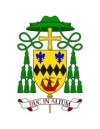Our Archdiocese
- Archbishop
- Bishop
- Vicar General & Episcopal Vicars
- Statistical Overview
- Boundaries of Archdiocese
- Organisational Structure
- Archdiocesan Assembly 2023-24
- Archdiocesan Plan 2016 - 2021
- History
- Coat of Arms
- Fifth Plenary Council of Australia
- Cathedral
- COVID-19 Position Statement
- Modern Slavery Statement
- Connect With Us
- MOBILE APP
Homily - St Patrick’s Day

St Patrick’s Day
By the Most Rev Don Sproxton
Auxiliary Bishop of Perth
St Mary’s Cathedral
Thursday, 17 March 2016
Download the full text in PDF
We gather this morning to celebrate the solemnity of St Patrick. We are Irish people who came to Australia over many years and have raised families in this, our new country; we are newly arrived Irish, the young who have come looking for a new life or following an opportunity to work for a time. The priests of the Cathedral parish are aware of the big numbers of newly arrived Irish who have made this place their spiritual home. In fact, the Dean has responded to the need of the young people who have experienced loneliness at Christmas, being so far from family and friends, by providing a special Christmas celebration.
If it had not been for the arrival of the Irish over so many generations, our faith would have developed in a very different way. This celebration, commemorating St Patrick, enables us to offer praise to God for the presence of the Irish families in the Church.
I am very interested, when reading the story of Patrick, in his early life, and the time when he was abducted from his homeland and taken into slavery to Ireland. This period of his life was so formative. It was the time when he came to know God. He had been brought up in a Christian family but, like many of us, he knew a lot about God without knowing Him. He confessed that, before his capture, he did not really believe in God, and thought that priests were foolish.
Made to shepherd sheep in the most isolated of country, he first discovered that he was not alone. He sensed the presence of another. Gradually, he realised that he was in the presence of God and began to pray. The experience that confirmed his belief in God as a loving and merciful Father came when Patrick escaped. He was so grateful that he could make the two hundred mile journey unimpeded to Wexford and to the coast where he fled by boat to France. He felt the hand of God upon him and he discovered the plan of God for him once he was free.
Patrick would be able to look back over his life and give thanks to God for the good and the bad things. Others would write about his achievements. His legacy included the abolition of slavery in Ireland; the incidents of murder and intertribal warfare had decreased; and the local kings were monitored by bishops who were placed near them and who watched for the rights of the people to be upheld.
All of this had become possible because Patrick came to know God in the isolation of his captivity. He came to know who God is.
Patrick had been taught the doctrines of the faith which are very important. What he lacked was the deeper knowledge that passes between persons.
Pope Francis is leading us through the Jubilee Year of Mercy. One of his hopes is that each person will recover the true image of the Father: the Father of mercy and compassion. The Gospel of Luke is the rich source from which we can receive the revelation of Christ about His Father. It contains, in the events of Jesus’ journey to Jerusalem and His parables, the real image of God. He knows and understands us, yet loves us profoundly. The Father holds nothing back. He offers us His life in His Son.
The Holy Spirit is given to us, in love, to be the power for us to recognise the presence of God and to confidently draw on His strength.
Patrick has become an outstanding example of one who felt the mercy of the Father and, in turn, became the face of God’s mercy to a people thirsting for freedom. He was effective as a missionary bishop for this reason. The hope of Pope Francis is that the Jubilee Year will firstly promote within each of us the heart of mercy and compassion, and consequently make our Church the face and agent of mercy in the world.
Let us pray that we will come to know who God is. If we are holding on to an image of God that causes us to be fearful, may the true image of the Father, as revealed to us by Jesus, replace it. May God’s patience, love and mercy be seen in us.
